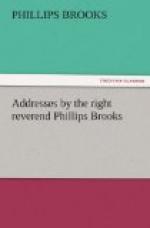illumination, and surprise himself by the things that
he might do? Oh! the littleness of the lives
that we are living! Oh! the way in which we fail
to comprehend, or when we do comprehend, deny to ourselves
the bigness of that thing which it is to be a man,
to be a child of God! Sometimes it dawns upon
us that we can see it opening into the vision of these
men and women in the New Testament. Sometimes
there opens to us the picture of this thing that we
might be, and then there are truly the trial moments
of our life. Then we lift up ourselves and claim
our liberty or, dastardly or cowardly, slink back
into the sluggish imprisonment in which we have been
living. How does all this affect that which we
are continually conscious of, urging upon ourselves
and upon one another? How does it affect the
whole question of a man’s sins? Oh! these
sins, the things we know so well! As we sit here
and stand here one entire hour, as we talk in this
sort of way, everybody knows the weaknesses of his
own nature, the sins of his own soul. Don’t
you know it? What shall we think about those
sins? It seems to me, my friends, that all this
great picture of the liberty into which Christ sets
man, in the first place does one thing which we are
longing to see done in the world. It takes away
the glamour and the splendor from sin. It breaks
that spell by which men think that the evil thing is
the glorious thing. If the evil thing be that
which Christ has told us that the evil thing is—which
I have no time to tell you now—if every
sin that you do is not simply a stain upon your soul,
but is keeping you out from some great and splendid
thing which you might do, then is there any sort of
splendor and glory about sin? How about the sins
that you did when you were young men? How can
you look back upon those sins and think what your
life might have been if it had been pure from the beginning,
think what you might have been if from the very beginning
you had caught sight of what it was to be a man?
And then your boy comes along. What are the men
in this town doing largely in many and many a house,
but letting their boys believe that the sins of their
early life are glorious things, except that those
things which they did, the base and wretched things
that they were doing when they were fifteen and twenty
and twenty-five and thirty years old, are the true
career of a human nature, are the true entrance into
human life? The miserable talk about sowing wild
oats, about getting through the necessary conditions
of life before a man comes to solemnity! Shame
upon any man who, having passed through the sinful
conditions and habits and dispositions of his earlier
life, has not carried out of them an absolute shame
for them, that shall let him say to his boy, by word
and by every utterance of his life within the house
where he and the boy live together, “Refrain,
for they are abominable things!” To get rid
of the glamour of sin, to get rid of the idea that
it is a glorious thing to be dissipated instead of




